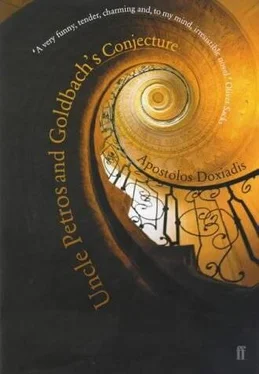Petros Papachristos was born in Athens in November 1895. He spent his early childhood in virtual isolation, the first-born of a self-made businessman whose sole concern was his work and a housewife whose sole concern was her husband.
Great loves are often born of loneliness, and this certainly seems to have been true of my uncle's lifelong affair with numbers. He discovered his particular aptitude for calculation early on and it didn't take long for it, for lack of other emotional diversions, to develop into a veritable passion. Even as a little boy, he filled his empty hours doing complicated sums, mostly in his head. By the time his two little brothers' arrival enlivened the household he was already so committed to his pursuit that no changes in family dynamics could distract him.
Petros' school, a religious institution run by French Jesuit brothers, upheld the Order's brilliant tradition in mathematics. Brother Nicolas, his first teacher, immediately recognized his bent and took him under his wing. With his guidance the boy began to cover material way beyond the capabilities of his classmates. Like most Jesuit mathematicians, Brother Nicolas specialized in (the already old-fashioned by that time) classical geometry. He spent his time contriving exercises which, although often ingenious and as a rule monstrously difficult, held no deeper mathematical interest. Petros solved them, as well as any others his teacher culled from the Jesuit maths books, with astonishing ease.
However, his particular passion from the very beginning lay in the Theory of Numbers, a field in which the brothers were not particularly knowledgeable. His undeniable talent together with constant practice since his earliest years had resulted in almost uncanny skills. When Petros, at the age of eleven, heard that every positive integer can be expressed as the sum of four squares, he astonished the good brothers by providing the breakdown of whatever number was suggested after only a few seconds of thought.
'What about 99, Pierre?' they'd ask.
'99 is equal to 8^2 plus 5^2 plus 3^2 plus 1^2,' he'd answer.
'And 290?'
'290 is equal to 12^2 plus 9^2 plus 7^2 plus 4^2' But how on earth can you do it so fast?' Petros described a method that seemed obvious to him, but to his teachers was difficult to understand and impossible to apply without paper, pencil and sufficient time. The procedure was based on leaps of logic that bypassed intermediate steps of calculation, clear evidence that the boy's mathematical intuition was already developed to an extraordinary degree.
After having taught him more or less everything they knew, when Petros was fifteen or so the brothers found themselves unable to answer their gifted pupil's constant flow of mathematical questions. It was then that the headmaster went to his father. Papachristos pere may not have had much time for his children, but he knew his duty where the Greek Orthodox faith was concerned. He had enrolled his eldest son in a school run by schismatic foreigners because it held prestige within the social elite to which he aspired to belong. When faced with the headmaster's proposal, however, that his son be sent to a monastery in France in order to further cultivate his mathematical talent, his mind immediately went to proselytism.
'The damn papists want to get their hands on my son,' he thought.
Still, despite lacking higher education, the elder Papachristos was anything but naive. Knowing from personal experience that one succeeds best in the field of endeavour one has a natural gift for, he had no desire to place any obstacles in his son's natural course. He asked around in the right circles and was informed of the existence, in Germany, of a great mathematician who also happened to belong to the Greek Orthodox persuasion, the renowned Professor Constantin Caratheodory. He immediately wrote to him for an appointment.
Father and son travelled together to Berlin, where Caratheodory received them in his office at the university, dressed like a banker. After a short chat with the father he asked to be left alone with the son. He led him to the blackboard, gave him a piece of chalk and questioned him. Petros solved integrals, calculated the sums of series and proved statements, as prompted. Then, once the esteemed professor had finished his examination, the boy reported his own discoveries: elaborate geometric constructions, complex algebraic identities and, particularly, observations regarding the properties of the integers. One of those was the following:
'Every even number greater than 2 can be written as a sum of two primes.'
'You surely can't prove that,’ said the famous mathematician.
'Not yet,’ answered Petros, 'although I'm sure it's a general principle. I've checked it up to 10,000!'
'What about the distribution of the prime numbers?' Caratheodory asked. 'Can you figure a way to calculate how many primes there are lesser than a given number n?'
'No,’ answered Petros, 'but as n approaches infinity the quantity gets very close to its ratio by the natural logarithm.'
Caratheodory gasped. 'You must have read that somewhere!'
'No, sir, it just seems a reasonable extrapolation from my tables. Besides, the only books at my school are about geometry.'
The Professor's previously stern expression now gave way to a beaming smile. He called Petros' father inside and told him that to subject his son to two more years of high school would be a complete waste of precious time. Denying his extraordinarily gifted boy the best that mathematical education had to offer would be tantamount, he said, to 'criminal negligence'. Caratheodory would arrange to have Petros immediately admitted to his university – if his guardian consented, of course.
My poor grandfather never had a choice: he had no desire to commit a crime, especially against his first-born.
Arrangements were made, and a few months later Petros returned to Berlin and moved into the family home of a business associate of his father 's, in Charlottenburg.
During the months preceding the start of the next academic year, the eldest daughter of the house, the eighteen-year-old Isolde, undertook to help the young foreign guest with his German. It being summer, the tutoring sessions were often conducted in secluded corners of the garden. When it got colder, Uncle Petros reminisced with a mellow smile, 'the instruction was continued in bed'.
Isolde was the first and (judging from his narrative) only love my uncle ever had. Their affair was brief and conducted in total secrecy. Their trysts would take place at irregular times in unlikely locations, at noon or midnight or dawn, in the shrubbery or the attic or the wine cellar, wherever and whenever the opportunity for invisibility beckoned: if her father found out, he would string him up by his thumbs, the girl had repeatedly warned her young lover.
For a while, Petros was totally disoriented by love. He became almost indifferent to everything other than his sweetheart, to the point that Caratheodory came to wonder for a while whether he might have been wrong in his original appreciation of the boy's potential. But after a few months of tortuous happiness ('alas, too few,' my uncle said with a sigh), Isolde abandoned the family home and the arms of her boy-lover in order to marry a dashing lieutenant of the Prussian artillery.
Petros was, of course, heartbroken.
If the intensity of his childhood passion for numbers was partly a recompense for the lack of familial tenderness, his immersion into higher mathematics at Berlin University was definitely made all the more complete for the loss of his beloved. The deeper he now delved into its endless ocean of abstract concepts and arcane symbols, the farther he was mercifully removed from the excruciatingly tender memories of 'dearest Isolde'. In fact, in her absence she became 'of much more use' (his words) to Petros. When they had first lain together on her bed (when she had first thrown him on to her bed, to be precise) she had softly muttered in his ear that what attracted her to him was his reputation as a Wunderkind , a little genius. In order to win her heart back, Petros now decided, there could be no half-measures. To impress her at a more mature age he should have to accomplish amazing intellectual feats, nothing short of becoming a Great Mathematician.
Читать дальше









